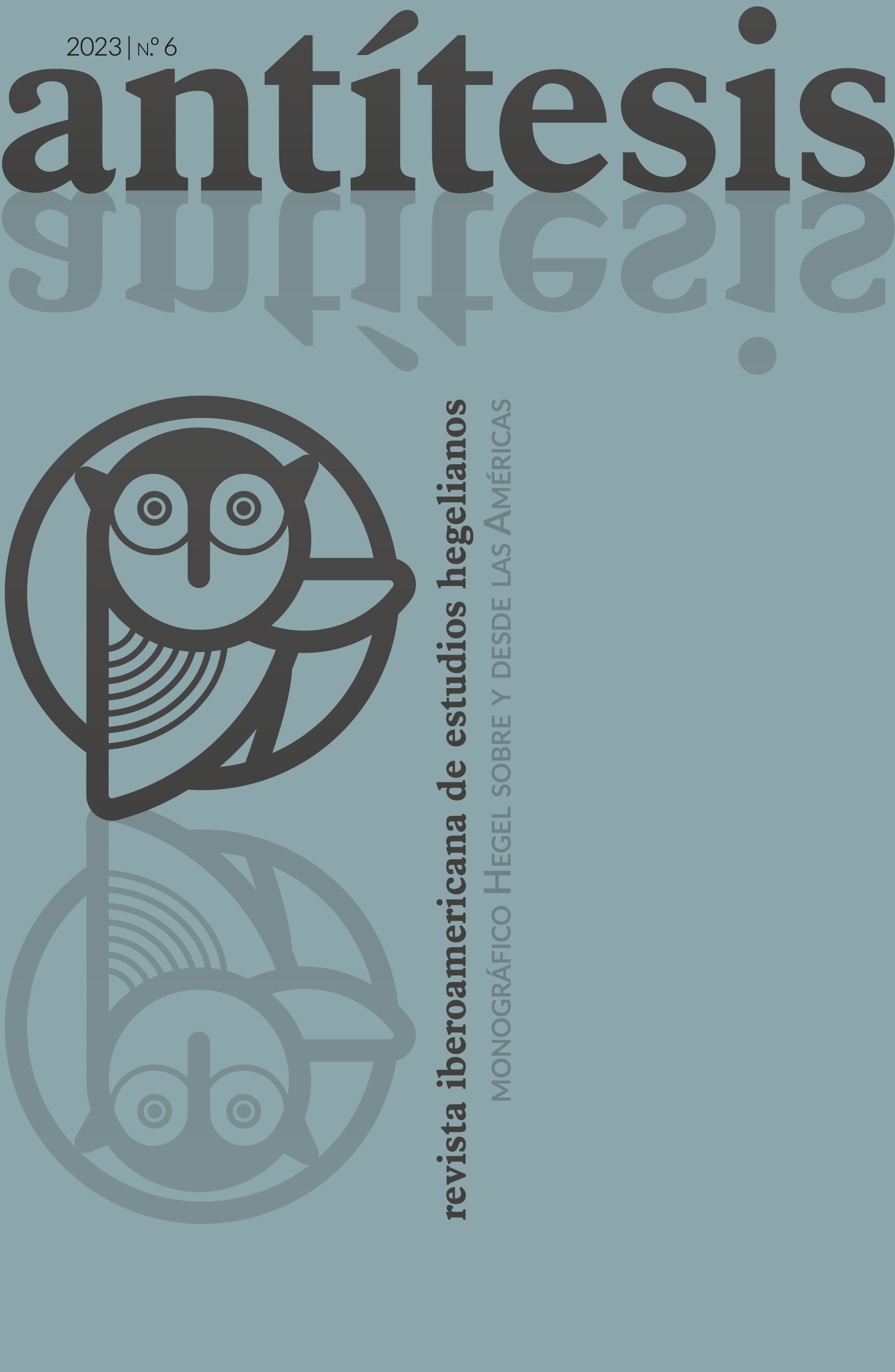Towards an Anthropology of World History: Reconstructing the Dialectics of Nature and Culture
Keywords:
Structuralism, Ontologies, Anthropomorphism, Ecology, Vital Activity, LaborCopyright (c) 2024 Martin Albert Persch

This work is licensed under a Creative Commons Attribution 4.0 International License.
Abstract
Especially in Latin American Anthropology, Hegel has become a red flag due to some of his problematic statements in his Lectures on the Philosophy of World History. This critical attitude towards his philosophy is reinforced by the great influence that structuralism, often characterised by explicitly anti-Hegelian positions, has exerted and continues to exert on Latin American social sciences. For some years now, Philippe Descola and Eduardo Viveiros de Castro have been at the forefront of a theoretical current within Amazonian anthropology that has set out to renew the interpretation of the cosmologies of Amerindian societies initiated by Claude Levi-Strauss almost half a century ago, drawing on post-structuralist philosophy. Cultures are no longer examined in terms of their concrete reproduction in a specific ecosystem, but are conceived as mere worldviews that would have been fixed on the basis of an original metaphysical deliberation, and for which ecological conditions seem to be only a kind of background noise. Descola uses the term ontology to describe them, and claims that all societies can be classified into one of the four kinds of ontologies he has elaborated: animism, totemism, analogism and naturalism.
In this article, I first try to show how, using a concept that goes back to Karl Marx, namely that of vital activity, it is quite possible to determine the form and formation of certain ontologies according to different ecological parameters. The decisive intellectual mechanism at play in this vital activity is the destruction of the object, named by Hegel in his Differenzschrift ; through labour, society remodels the ecosystem it inhabits, so that natural phenomena lose their anthropomorphic character for the collective. From this intuition, it will be possible to trace the development of the ontologies named by Descola to Hegel's reflections on religion, formulated in the Phenomenology of Spirit. Finally, we will review some of Hegel's often (and partly justifiably) criticised observations on African and American societies and evaluate them in relation to the current state of anthropological research, but we will also show at the same time that some of the philosopher's lines of thought evidence an astonishing anthropological insight, and that his philosophy certainly allows us to rethink anthropological problems of the utmost importance.
Downloads
References
BERTRAM, Georg W.. Hegel “Phänomenologie des Geistes“. Stuttgart: Reclam, 2017.
DESCOLA, Philippe. “Las cosmologías indígenas de la Amazonía”. En Tierra Dentro: Territorio indígena y percepción del entorno. Copenhague: IGWIA, 2004.
DESCOLA, Philippe. Más allá de la Naturaleza y Cultura. Editores. Buenos Aires: Amorrortu, 2012.
DESCOLA, Philippe. “Varieties of Ontological pluralism”. En Comparative Metaphysics: Ontology after Anthropology, editado por CHARBONNIER, Pierre; SALMON, Gildas; SKAFISH, Peter. London: Rowman and Littlefield International, 2017.
GRAEBER, David y WENGROW, David. Anfänge.Stuttgart: Klett-Cotta, 2021
GROSS, Daniel. “Protein Capture and Cultural Developemente in the Amazon Basin”, en American Anthropologist, 77 (3), 526-54. New York: Wiley-Blackwell, 1975.
GROSS, Daniel. “Proteina y Cultura en la Amazonía, una segunda revisión”, en Revista Amazonia Peruana 3 (6), 85- 97. CAAAP. Lima: CAAAP, 1982.
HEGEL, Georg W.F.. Phänomenologie des Geistes. Frankfurt a.M.: Suhrkamp Verlag, 2020.
HEGEL, Georg W.F.. Vorlesungen über die Philosophie der Geschichte. Frankfurt a.M.: Suhrkamp Verlag, 2020.
HORNBORG, Alf y HILL, Jonathan. Ethnicity an ancient Amazonia. Reconstructing Past Identities from Archeology, Linguistics, and Ethnohistory. Colorado : University Press Colorado, 2011.
ILIENKOV, Evald. Lógica Dialéctica. Madrid: 2Cuadrados, 2022.
LATRAP, Donald. El Alto Amazonas. Iquitos: Instituto Cultural Runa, 2010.
LEVI-STRAUSS, Claude. Das Wilde Denken. Frankfurt a.M.: Suhrkamp Verlag, 1973.
LEVI-STRAUSS, Claude. Traurige Tropen. Frankfurt a.M.: Suhrkamp Verlag, 1978
LUCÁKS, Georg. Der junge Hegel. Frankfurt a.M.: Suhrkamp Verlag, 1973
MEGGERS, Betty. Amazonía: hombre y cultura en un paraíso ilusorio. México D.F: Siglo Veintiuno Editores, 1999.
ROOSEVELT, Ann. Panama: Prehistoric Maiz and Manioc subsistence along the amazon Orinoco. New York: New York Academic Press, 1980.
ROOSEVELT, Ann. Mountbuilders of the Amazon. San Diego : San Diego Academic Press, 1990
SAHLINS, Marshall. “On the ontological sheme of Beyond Nature and Culture”, en Hau: Journal of Ethnographic Theory 4 (1): 281–290. Chicago: University of Chicago Press, 2014.
TOMASELLO, Michael ; CARPENTER, Malinda y LIZSKOWSKI, Ulf. “A new look at infant pointing ”, en Child Development, 78, 705–722. Hoboken : Wiley-Blackwell, 2007.
TURNER, Terence. “The Ge and Bororo Societies as Dialectical Systems”, en Dialectical Societies. The Ge and Bororo of Central Brazil, editado por MAYBURI-LEWIS, David. Cambridge, Massachusetts: Harvard University Press, 1979.
VIVEIROS DE CASTRO, Eduardo. “Perspectivismo y multinaturalismo en la América indígena”, en Tierra Dentro: Territorio indígena y percepción del entorno. Copenhague: IGWIA, 2004.
VIVEIROS DE CASTRO, Eduardo. Metafísicas Caníbales, Líneas de Antropología Postestructural. Katz Editores. Buenos Aires: Katz Editores, 2011.
